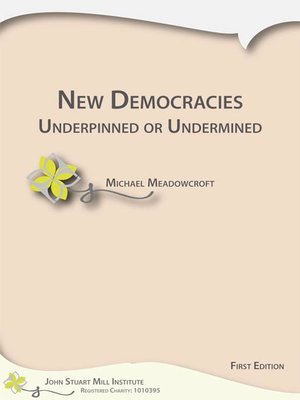
Sign up to save your library
With an OverDrive account, you can save your favorite libraries for at-a-glance information about availability. Find out more about OverDrive accounts.
Find this title in Libby, the library reading app by OverDrive.



Search for a digital library with this title
Title found at these libraries:
| Library Name | Distance |
|---|---|
| Loading... |
The second Dame Penelope Jessel Memorial Lecture by Michael Meadowcroft to the John Stuart Institute. It is highly appropriate that this second Penelope Jessel Memorial Lecture should be concentrating on larger issues beyond our own shores. Penelope was a thorough and instinctive internationalist who would have been exasperated by the increasing lack of confidence amongst so many politicians in their ability to participate in the European debate.
Although there has been assistance to new democracies from the more established ones for a very long time, (for instance, The Electoral Reform Society was involved in advising on electoral systems for the Durban City Council in 1910) the burgeoning of western assistance and associated measures has taken place over just a decade. The biggest influence on this remarkable trend was the accession to power in the Soviet Union of Mikhail Gorbachev. Suddenly, with the break-up of the Soviet empire, a host of new republics with no history of free elections came clamouring for assistance. Also, as communism ceased to be seen as a virulent threat, President de Klerk was able to unban the ANC and the South African Communist party in February 1990 and thus spark off a move towards multiparty democracy in Africa. We are also now seeing the same trend in the Middle East, and also in South East Asia, where in the June 7th 1999 election in Indonesia 105 million people voted - making it the second largest democracy in the world after India. Curiously, despite the multiplicity of electoral assistance and monitoring missions and the billions of dollars poured into them over recent years, there has been hardly any move to evaluate the work and to draw lessons for future involvement. Such evaluation is overdue and could perhaps be an appropriate task for the Stockholm based International Institute for Democratic and Electoral Assistance (International IDEA) which was set up to be, amongst other things, a repository for good electoral practice.







